Exploring AlSouq: Dubai's Traditional Market Dynamics
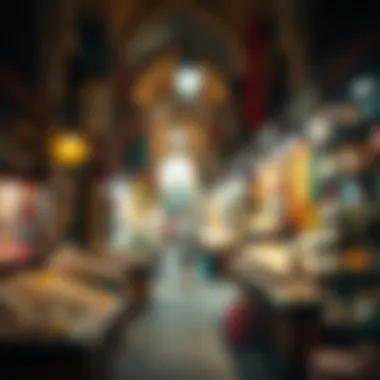
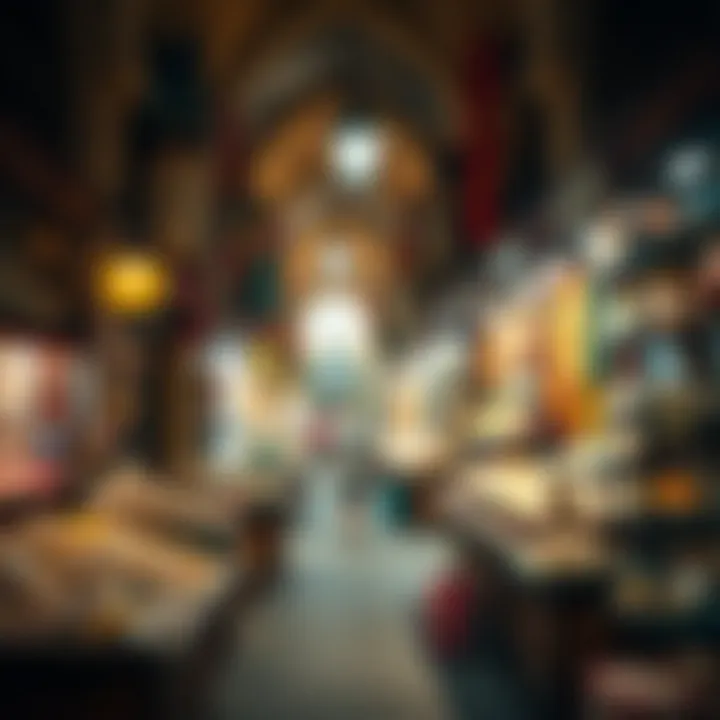
Intro
Nestled in the heart of Dubai, AlSouq embodies a blend of history and modernity. This vibrant traditional market serves not only as a shopping destination but also as a cultural hub reflecting the rich heritage of the region. To understand AlSouq is to grasp the essence of Dubai itself—where bustling marketplaces thrive alongside towering skyscrapers and glitzy malls.
The significance of AlSouq extends beyond mere commerce. It serves as a space for social interaction, bringing together locals and visitors to explore an array of goods that speak to the diversity of the city. From intricate textiles to spice-laden aisles and artisanal crafts, the market represents a vital link to the Emirati identity.
Additionally, the interplay between AlSouq's legacy and the modern real estate landscape of Dubai presents a fascinating study of coexistence. As the city continues to evolve into a global metropolis, discerning buyers and investors can benefit from understanding these dynamics. A closer look at how heritage markets fit into the broader economic narrative offers insights necessary for making informed decisions.
The following sections delve deeper into market trends and insights, illuminating how this traditional marketplace adapts to shifting consumer demands while retaining its core identity.
Prolusion to AlSouq
AlSouq isn’t just a market; it's the pulse of Dubai's vibrant life. This traditional marketplace serves as a window into the history, culture, and commerce of the region. Within its narrow lanes lie the essence of what makes Dubai unique—a blend of ancient tradition paired with modernity, a showcase of the rich tapestry of local history and the active lifestyle of today. To neglect AlSouq while considering Dubai would be akin to overlooking a crucial chapter in the narrative of the city.
Delving into AlSouq allows us to understand not only the products that are sold but also the social interactions that bring these transactions to life. It is a hub of commerce, yes, but it's also a center for community, where stories are traded as eagerly as goods. Whether one is in search of handwoven textiles or rare spices, the allure of the market is undeniable.
Key Elements of AlSouq
- Cultural Heritage: AlSouq stands as a testament to Emirati traditions. It reflects a lifestyle that prioritizes community and shared experiences.
- Economic Importance: This marketplace plays a significant role in Dubai's economy by providing job opportunities for local traders and attracting tourists.
- Social Dynamics: The interactions among vendors and customers are foundational, illustrating a microcosm of social life in Dubai.
Visiting AlSouq is akin to stepping back in time, where every stall holds a story. Through AlSouq, we also draw connections to modern Dubai, a city characterized by its futuristic skyline and rapid development. This market situates itself as a bridge between eras, highlighting how traditions can coexist with change.
In this article, we will explore what defines AlSouq, tracing its historical roots and examining its relevance in a rapidly evolving urban landscape.
Cultural Significance of AlSouq
AlSouq is not merely a market; it embodies the essence of community, tradition, and culture. Situated in the heart of Dubai, its significant role extends beyond just commerce. It serves as a vibrant hub where cultural exchanges thrive, weaving a rich tapestry of the past and the present. For the discerning observer, AlSouq reflects how culture can influence social interactions and economic dynamics.
A Centre for Community Life
In AlSouq, locals and visitors alike find more than just goods; they encounter a living representation of the community’s spirit. Traditionally, markets have been the pulse of city life, a concept that resonates with the people who walk its bustling paths. The market is where friendships are forged and old acquaintances are rekindled over cups of Arabic coffee or sweet dates.
Consider a typical Friday morning in AlSouq. Families gather to purchase fresh produce, artisans display their crafts, and old-timers sit on benches, exchanging stories. This social hub fosters a sense of belonging as it brings together diverse groups, from seasoned traders to curious tourists. It’s a dynamic interplay where cultural narratives unfold, showcasing the heart of Emirati traditions.
- Cultural Exchanges: Visitors from around the world converge at AlSouq, introducing their customs and engaging in shared experiences.
- Local Engagement: The presence of Emirati vendors reinforces a unique cultural identity and upholds traditions in the face of urban expansion.
Traditions and Customs
The traditions woven into AlSouq are as intricate as the textiles sold within its labyrinthine alleys. Vendors often greet customers with warm smiles and heartfelt , inviting them to explore their wares. The practice of bargaining is not merely transactional; it is a dance of respect and camaraderie deeply embedded in the culture.
Festivals and special occasions further enliven the market. During Ramadan, for instance, AlSouq transforms into a feast for the senses. Lanterns hang overhead, and the air is filled with the scent of spices as night falls. Traditional Emirati music fills the atmosphere, enhancing the sensory experience. Such events are pivotal in promoting cultural heritage and ensuring that younger generations remain connected to their roots.
- Culinary Heritage: Street vendors offer local delicacies like shawarma and kunafa, further promoting the cultural landscape.
- Artistic Expressions: Handicrafts, pottery, and traditional garments stand as testaments to Emirati artistry, available for both locals and collectors.
"In every corner of AlSouq lies an untold story, waiting for curious ears to listen."
Through its vibrant interactions and cultural offerings, AlSouq remains a cornerstone of Dubai's identity. Understanding its significance is vital for investors and agents keen on navigating a market that thrives on traditions while adapting to the modern world. The narrative of AlSouq is indeed enmeshed with Dubai’s ongoing evolution, reflecting how tradition and contemporaneity can coexist harmoniously.
Economic Role of AlSouq
The economic dynamics of AlSouq play a pivotal role in shaping not only the market itself but also the broader economic fabric of Dubai. This section dives into the ways AlSouq serves as a cornerstone for local employment and its contributions to the economy. Understanding these aspects allows us to appreciate how this traditional market persists amidst rapid modernization and urban development.
Source of Employment
AlSouq is much more than a shopping destination; it's a vibrant ecosystem that generates a significant amount of job opportunities. Many individuals rely on the market for their livelihoods, working as vendors, craftsmen, and service providers. At the heart of AlSouq, you will find the hustle and bustle of merchants selling everything from spices to handcrafted jewelry. Many of these vendors are family-owned businesses, passed down through generations.
The employment derived from AlSouq is diverse and includes:
- Artisans: Skilled workers who create handmade goods such as pottery, textiles, and jewelry, often reflecting the rich heritage of Dubai.
- Retail Staff: Individuals who manage stalls, assist customers, and handle transactions in various shops.
- Service Workers: These include cleaners, security personnel, and maintenance staff who ensure that the market is a pleasant space for visitors.
- Food Vendors: Stalls serving local delicacies provide essential employment and contribute to the area's unique culinary offerings.
The economic activities generated here support not just the vendors but create a ripple effect throughout the community, influencing numerous sectors connected to retail, services, and tourism. For instance, as the foot traffic increases, businesses nearby also benefit, enhancing the local job market even further.
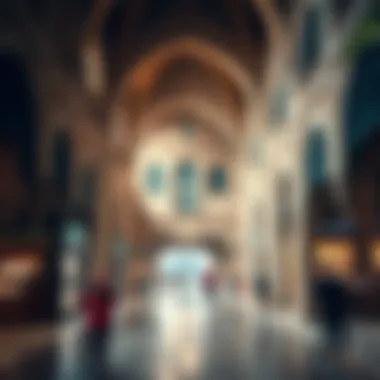
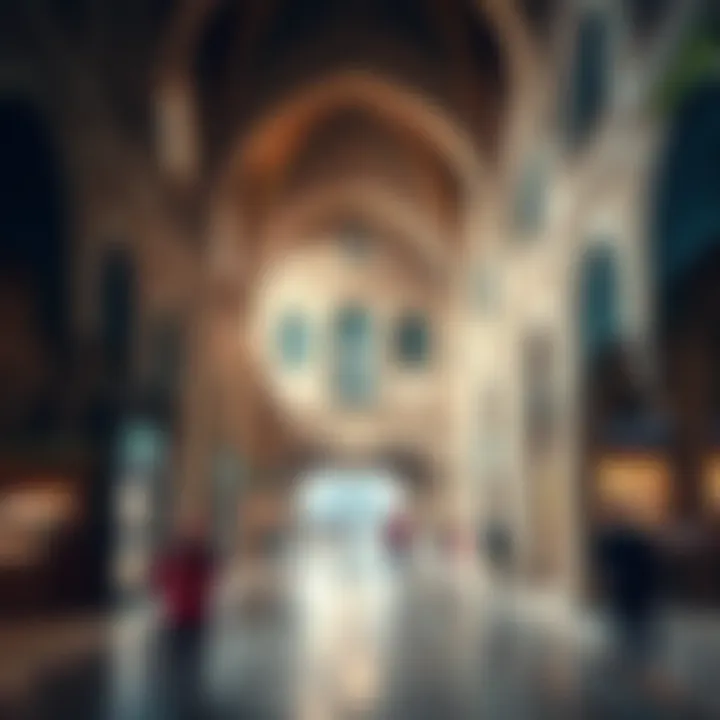
Contribution to Local Economy
AlSouq significantly bolsters Dubai’s local economy through various mechanisms. The market's unique offerings and cultural experiences attract a diverse array of both locals and tourists, leading to a continuous inflow of cash. Here are some key contributions:
- Consumer Spending: With unique local products and experiences, tourists spend considerable amounts on goods and services within AlSouq. This direct spending benefits the vendors and stimulates the surrounding economy.
- Tourism Sector Integration: AlSouq often acts as a magnet for cultural tourism, which is a growing segment of Dubai’s economy. Visitors keen on experiencing traditional Emirati culture flock to the market. A rising number of tourists specifically seek out AlSouq to immerse themselves in the local atmosphere.
- Cultural Exchange: The market serves as an interface for cultural dialogue, attracting international businesses that wish to collaborate with local artisans and traders. This imbues the local economy with innovative practices and global trends that can lead to further economic diversification.
- Event Hosting: Hosting various cultural events, exhibitions, and festivals helps raise awareness about local products and crafts, thereby generating additional revenue.
"The market exemplifies how tradition and commerce can interlace beautifully, ensuring both are preserved amidst towering skyscrapers."
In summary, AlSouq maintains its relevance in Dubai’s economy through its role as a source of employment and as a catalyst for local economic growth. As modernization sweeps through Dubai, it continues to provide the essential connection between the city’s rich heritage and its ambitious future.
Goods and Offerings at AlSouq
The offerings at AlSouq form the backbone of its allure, providing not just a market but a cultural tapestry woven with vibrant threads of tradition and craftsmanship. Here, the past and present mingle, creating a shopping experience unlike any other. Visitors and locals alike flock to AlSouq not only for goods but to absorb the atmosphere rich with heritage and community spirit.
Traditional Crafts and Artifacts
In AlSouq, traditional crafts and artifacts stand as testament to the skill and artistry handed down through generations. From intricate wooden carvings to beautifully crafted pottery, every piece tells a story; a whisper of the heritage from which it sprang. Artisans put their heart and soul into these creations, often working right in front of you, demonstrating their techniques. This creates an engaging environment where customers can appreciate the artistry and connect with the craftsmen themselves.
The craftsmanship is not merely about aesthetic appeal; these items often hold significant cultural meanings. For instance, khanjars, the traditional curved daggers, are not just weapons but symbols of status and honor. Buying such items serves a dual purpose: it supports local artisans while also preserving a fading craft.
Spices and Local Delicacies
Venture deeper into AlSouq, and you’ll find a sensory overload in the spice section. The air fills with earthy, vibrant scents as vendors line their stalls with colorful heaps of spices. Local delicacies enhance the culinary landscape of Dubai, offering a taste of the region's diverse flavors. Sumac, a tangy seasoning ubiquitous in Middle Eastern cooking, and za'atar, a blend that enhances flatbreads, feature prominently among the offerings.
Beyond spices, the food stalls teem with local delicacies like samosas, dates, and baklava, wrapping you in a comforting embrace of aroma and taste. The opportunity to sample these delights right at the source fosters a deeper appreciation for the region's culinary diversity and history. One might think of it as a culinary passport, allowing you a taste of genuine Emirati culture.
Textiles and Clothing
Clothing in AlSouq offers more than just fabric; it embodies cultural identity and expression. The vibrant patterns of traditional kanduras and the intricate designs of abayas reflect the rich tapestry of Emirati heritage. Here, shoppers can find garments tailored from materials that speak of both tradition and modernity.
In this space, one can still find handmade textiles, a rarity in today’s fast-fashion world. The use of natural dyes and handcrafted techniques tells of a respectful dialogue with the past; it's not just about clothing, it’s a statement of values and history.
Overall, the range of goods at AlSouq illustrates the market’s vital role as a custodian of culture. Each item is infused with meaning and lends to the market’s lively environment. In this way, AlSouq is not just a place to buy but a cherished space that fosters connection—to the past, to each other, and to the city's ongoing story.
"AlSouq is where tradition meets contemporary life, offering treasures that carry the weight of history in every stitch, every flavor, and every crafted piece."
As the city of Dubai continues to evolve, the goods and offerings at AlSouq remind us of the enduring nature of culture amid change, making it a cornerstone of the city’s identity.
Social Dynamics of AlSouq
Navigating through the lively mazes of AlSouq reveals much more than mere commerce; it unveils the intricate tapestry of social interactions that shape the experience of both vendors and buyers. At its essence, the social dynamics of AlSouq represent a microcosm of community life, where relationships are nurtured and cultural exchanges flourish. These interactions not only breathe life into the market but also underscore its enduring significance in the local community.
Interactions Among Vendors and Customers
When you step into AlSouq, you're not just entering a marketplace; you’re walking into a hub of conversations. The interactions between vendors and customers serve as the backbone of the market's vibrancy. Here, negotiation isn't just about haggling over prices. It's a dance of respect and rapport, where vendors often share stories about their products, infusing them with a personal touch.
The banter and laughter echoing from the stalls create an atmosphere that’s almost palpable. Many vendors are keen to take a moment, welcoming buyers with friendly gestures and anecdotes about their crafts or spices. This engagement creates a sense of community and encourages return visits, as customers feel valued and connected. The routine becomes a social ritual—each visit spurs friendships that form amidst the products on display.
For tourists and locals alike, such interactions offer more than a buying experience; they foster a sense of belonging, creating a bond that transcends mere transactional exchanges.
Role in Daily Life
AlSouq occupies a significant role in the daily lives of many who dwell in Dubai. It’s not just a place to purchase goods; it functions as a vital social gathering point. Here, families shop on weekends, and friends meet over cups of traditional Emirati coffee, allowing for rich conversations to unfold. The market stands as a living testament to the culture where everyday life and commerce blend seamlessly.
In these bustling alleys, children watch their parents barter, while elders reminisce about the old days, cultivating an understanding of cultural heritage that’s passed down through generations. This daily engagement with AlSouq symbolizes much more than economic activity. It encapsulates the very essence of the community's heartbeat.
Over time, such dynamics have played a crucial role in strengthening social ties and maintaining a communal identity. The warmth of a familiar vendor greeting you by name can turn a simple shopping trip into an integral part of daily life, enriching the overall experience.
By recognizing the social dynamics of AlSouq, we can appreciate how this traditional market mirrors the broader cultural landscape of Dubai. It stands not only as a place for commerce but as a venue for cultural engagement and social interaction, solidifying its place in the hearts of those who frequent it.
Modernization and Change
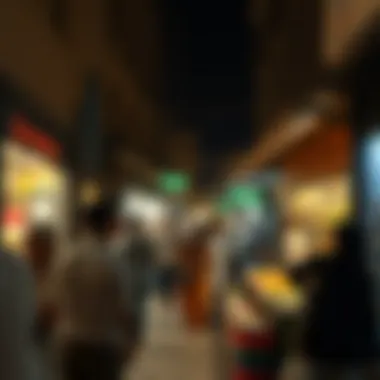
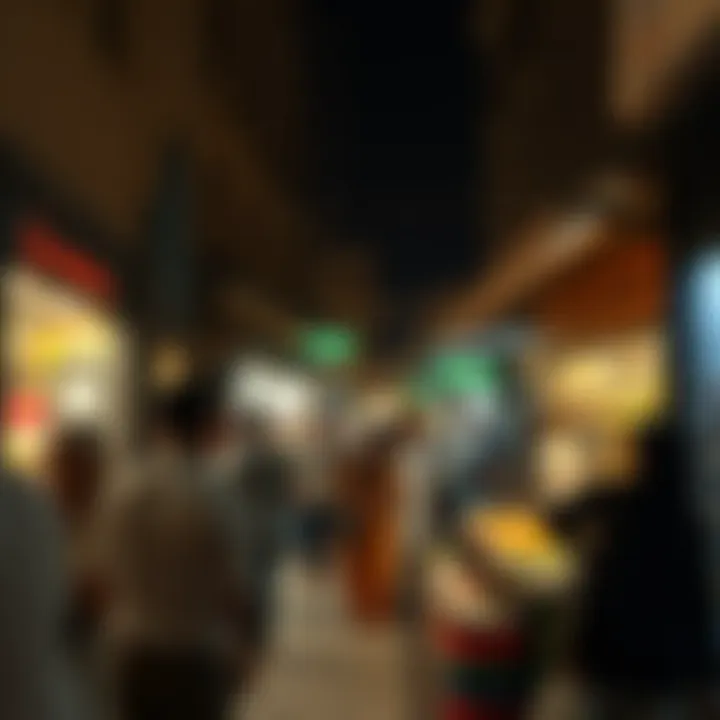
Modernization and change are essential threads in the fabric of AlSouq’s identity, reflecting not only the market's adaptability but also Dubai's evolution as a global nexus. As this traditional marketplace grapples with the relentless currents of contemporary commerce, these dynamics serve a crucial purpose in preserving its cultural essence while meeting the demands of a rapidly changing society.
In the context of AlSouq, modernization does not seek to erase its rich history; rather, it aims to enhance the market’s viability in an increasingly competitive landscape. As shopping habits shift and global trends permeate local customs, it’s vital for AlSouq to embrace change while holding onto its roots, ensuring that it remains a vibrant, welcoming space for both locals and tourists alike.
Impact of Globalization
Globalization plays a pivotal role in shaping the trajectory of AlSouq, a phenomenon that brings both opportunities and challenges. On one hand, global ties open the door to international visitors and foreign investments, drawing patrons from various corners of the world. This influx not only spices up market dynamics with diverse cultural influences but also boosts the entrepreneurial spirit among local vendors as they engage with a broader audience.
However, this wave of globalization also presents pressure. With the rise of online shopping and mega malls, traditional markets like AlSouq need to reassess their strategic positioning. For instance:
- Many vendors now incorporate digital payment systems, allowing tourists to enjoy a seamless transaction experience.
- Collaborations between local artisans and international brands enhance the market's appeal, offering visitors unique products that fuse cultural heritage with modern design.
"AlSouq continues to redefine itself, navigating the fine line between preserving tradition and embracing modernity."
This duality is what makes AlSouq not just a market, but an ongoing story of adaptation.
Technology and Commerce
The introduction of technology into the marketplace has revolutionized how business is conducted at AlSouq. This is particularly important in an age where convenience holds sway. For example, vendors are now utilizing platforms such as social media and e-commerce websites to showcase their goods and reach a wider customer base. By blending traditional selling methods with modern tech, AlSouq becomes a hybrid space, appealing to both nostalgic locals and forward-thinking tourists.
Elements of technological adoption include:
- Mobile Applications: Local businesses are creating apps for easier browsing and purchasing, reflecting a shift towards convenience.
- Social Media Marketing: Vendors share their unique stories and products through platforms like Instagram and Facebook, attracting followers and increasing foot traffic.
- Customer Feedback Systems: Innovation also includes mechanisms for gathering customer feedback, enabling vendors to improve their offerings based on direct consumer insights.
These transformations ultimately help create a market atmosphere that is both lively and convenient, ensuring AlSouq remains relevant in the face of sweeping changes in shopping behavior. The interplay of technology with traditional commerce at AlSouq presents a glimpse into how this historical market can strategically navigate the future.
AlSouq and Dubai’s Real Estate Market
Dubai's real estate market is known for its impressive skyline and luxurious developments, but nestled within this modernity is AlSouq, a traditional market that serves as a vital thread in Dubai's cultural and economic fabric. The relationship between AlSouq and the real estate landscape in Dubai is dictated by proximity and opportunity. Over the years, as Dubai has evolved into a global metropolis, AlSouq began to take on a new role amidst this transformation.
Proximity to Major Developments
AlSouq's strategic location in relation to several of Dubai's major developments can’t be understated. The market is often a stone's throw away from skyscrapers, hotels, and financial hubs, allowing it to attract both tourists and locals alike. For instance, being near the iconic Burj Khalifa and the bustling Dubai Mall not only provides a steady flow of visitors but is also beneficial for businesses looking to tap into the thriving local economy.
Accessibility is key—AlSouq lies along transport routes that connect it seamlessly to new residential neighborhoods and commercial spaces. As more real estate projects spring up, especially in areas like Downtown Dubai and Business Bay, the market stands to benefit tremendously. Not only does it enhance foot traffic, but it also solidifies AlSouq’s role as a cultural touchstone amid these towering structures.
"The proximity of AlSouq to major developments creates a unique blend of tradition and modernity, making it vital for sustaining local commerce."
Real Estate Opportunities in the Vicinity
The vicinity of AlSouq is brimming with real estate opportunities that are capturing the attention of investors and buyers alike. The increasing demand for residential spaces has sparked interest in properties that sit within reach of AlSouq, leveraging its cultural allure and accessibility. Many investors are now looking at the historical significance of AlSouq as an advantage when promoting residential properties nearby.
Additionally, commercial properties that aim to serve the diverse clientele visiting AlSouq are becoming increasingly sought after. Shops, cafes, and co-working spaces that embody the market's traditional charm while integrating modern offerings stand to do well. This creates a symbiotic relationship where the success of nearby real estate projects can drive further traffic to AlSouq, while at the same time, the market’s vibrancy supports the growth of the real estate sector.
In sum, as Dubai continues to develop at a breakneck pace, the interplay between AlSouq and the surrounding real estate market exemplifies how tradition can coexist harmoniously with modern growth. The potential for economic revitalization led by this traditional market can turn it into a focal point for investments and new opportunities.
Tourism and AlSouq
The relationship between tourism and AlSouq is akin to two sides of the same coin, each enhancing the other’s value and visibility. AlSouq stands not just as a retail hub, but as a living museum where visitors can immerse themselves in the rich traditions that Dubai embodies. Tourists flock to experience its vibrant atmosphere, historical context, and the authentic local culture. For buyers and investors, understanding these dynamics is vital as they often strive to tap into the lucrative tourism market.
Attraction for Visitors
AlSouq draws in crowds like moths to a flame. This natural allure can be attributed to its vibrant displays, aromatic spices, and the friendly banter between vendors and tourists. Each alleyway within the market tells a story, and visitors are invited to partake in a sensory experience that is wholly unique to Dubai. The sounds of laughter, the scent of exotic spices, and the sight of beautifully crafted goods crafted by artisanal hands offer a compelling reason for tourists to visit.
Factors enhancing its attraction include:
- Cultural Richness: AlSouq is a bastion of traditional Emirati culture, making it an educational stop for those wanting to learn more about the heritage of the UAE.
- Unique Souvenirs: Tourists can purchase traditional handicrafts and textiles that aren't readily available elsewhere, making for distinctive memories to take home.
- Local Interaction: Conversations with local artisans and merchants offer a more personal connection to the culture, a key draw for many visitors.
Experiences Offered
At AlSouq, experiences abound, each contributing to the rich tapestry that makes the market a must-visit. Beyond mere shopping, the visit becomes an exploration of identity, tradition, and community.
Visitors can partake in:


- Traditional Bargaining: Engaging in friendly negotiations with vendors provides tourists with an authentic market experience. It's a dance of wits that adds excitement to the buying process.
- Workshops and Demonstrations: Some stalls offer live demonstrations of traditional crafting methods, where visitors might see artisans at work, creating pottery or weaving textiles right before their eyes.
- Street Food Tastings: The market's food stalls offer local delicacies, providing another layer of experience through tastes and flavors. Trying dishes like shawarma or baklava becomes a moment of sharing culinary traditions.
"Visiting AlSouq is not just about shopping; it's about experiencing the heartbeat of Dubai's culture."
In summary, the interplay between tourism and AlSouq is quite significant, offering experiences that can't be replicated anywhere else in Dubai. It beckons travelers not only to shop but to delve deeper into the history and culture that shape this stunning city.
Challenges Facing AlSouq
AlSouq stands as a cultural emblem of Dubai, but it’s not without its fair share of hurdles. These challenges shape the experience for shoppers and can threaten the very essence of this traditional market. A closer look at these issues reveals the dynamics that could dictate the fate of AlSouq in the rapidly evolving urban landscape of Dubai.
Competition from Modern Malls
The rise of modern shopping malls, such as The Dubai Mall and Mall of the Emirates, presents a formidable challenge for AlSouq. These malls aren’t just retail spaces; they offer a unique entertainment experience along with high-end shopping, food courts, and cinemas. Customers looking for convenience often find themselves wandering into these colossal establishments, drawn in by the allure of ambiance and variety.
- Traction of Modern Facilities: The smooth blend of shopping, leisure, and dining has attracted many locals and tourists. With air-conditioned comfort and a wide range of international brands, it becomes increasingly hard for traditional markets to compete.
- Changing Preferences: Younger generations may not have the same affinity for traditional shopping experiences, preferring the convenience and variety offered by modern retail facilities.
These malls represent a shift in consumer behavior driven by technology and international influences. While shops in AlSouq provide unique, handcrafted products and a personal touch, the competition pulls in customers with a different kind of charm—the sparkle of grand lobbies and the latest fashions from around the world.
Preserving Cultural Heritage
As AlSouq navigates its challenges, preserving its cultural heritage remains paramount. This aspect is not merely about maintaining old buildings; it embodies safeguarding a way of life. Obstacles such as modernization and western influences pose risks to its historical significance.
- Cultural Identity: AlSouq is more than a marketplace; it is a keeper of traditions, representing a lifestyle that has persisted for centuries. Keeping this identity intact amidst the glitzy pull of shopping malls is crucial.
- Community Involvement: Engaging local artisans and businesses ensures that the market continues to thrive with authentic products reflecting local culture.
Efforts are needed to create awareness of the rich history that surrounds AlSouq. Investing in community programs can enhance visitor interaction and deepen appreciation for local crafts. As tourists seek unique experiences, highlighting the stories behind products can create a sense of place that modern malls lack.
By addressing these challenges effectively, AlSouq can not only survive but thrive, standing as a testament to Dubai's rich history while embracing the future.
Future Trends at AlSouq
As the urban tapestry of Dubai continues to expand, the future of AlSouq stands at a crossroads of tradition and innovation. This section delves into how this marketplace, rich in history, is adapting to both modern consumer behavior and global economic shifts. Understanding these future trends is crucial, not just for keeping the essence of AlSouq alive, but also for reinforcing its role as a vital economic and cultural hub in Dubai's ever-evolving landscape.
Innovations in Market Practices
The winds of change are blowing through AlSouq, where traditional market practices are being redefined. Merchants are embracing technology to enhance the shopping experience for customers. Mobile payments, online storefronts, and inventory management systems are just the beginning. Vendors are increasingly turning to social media platforms like Instagram and Facebook to attract a younger demographic who prefer engaging with brands online before stepping into an actual store.
Moreover, personalization has become the name of the game. Vendors are utilizing data analytics to understand customer preferences and tailor their offerings accordingly. This not only improves customer satisfaction but also boosts sales. For instance, if a shop specializing in traditional textiles notes that certain colors or patterns are trending, they can quickly adjust their inventory to meet these insights. Such innovations not only keep the marketplace alive but also render it relevant in today’s fast-paced retail environment.
Sustainable Practices
Sustainability is no longer just a buzzword; it's a necessity. At AlSouq, there's a palpable shift toward eco-friendly practices. Vendors are increasingly recognizing the importance of sourcing products sustainably and minimizing waste. Traditional craftspeople, for instance, are now adopting recyclable materials in their creations, ensuring that artisanship does not come at the expense of the environment.
Additionally, there are initiatives aimed at reducing plastic usage. Many shops have started offering biodegradable packaging options or encouraging customers to bring their own reusable bags. Community programs educating both merchants and customers about sustainability, and how it factors into their shopping habits are blossoming.
"The essence of a market thrives not just in its goods but also in its ability to adapt to the changing values of its community."
This emphasis on sustainability is not merely reactive; it reflects a proactive approach to future-proofing the market. As consumers become increasingly aware of their choices, AlSouq's commitment to sustainability could enhance its attractiveness not just to local patrons, but also to a growing number of tourists who prioritize eco-conscious experiences.
In summary, the future trends at AlSouq are a tapestry of innovation and sustainability. As this iconic marketplace navigates the complexities of modern life, it continues to hold a mirror to the past while simultaneously bending towards a greener and more adaptive future.
End: Reflecting on AlSouq’s Legacy
AlSouq stands as a testament to the intricate tapestry of Dubai's cultural and economic fabric. This market, with its vibrant offerings and lively exchanges, embodies centuries of tradition while embracing the present and the future. Focusing on AlSouq's legacy highlights not only its role as a commercial hub but also as a cherished social space that fosters community connections and intercultural dialogue.
Continuity of Tradition
In a world that often leans towards rapid modernization, AlSouq remains a symbol of continuity. The market encapsulates the essence of Arab hospitality and the rich traditions associated with commerce and trade. Vendors showcasing their wares, artisans practicing their crafts, and the myriad fragrances of spices wafting through the air all remind visitors of a lifestyle rooted deeply in history.
- Embracing heritage: AlSouq actively promotes traditional crafts such as weaving, pottery, and metalwork. These practices are not just remnants of the past but are lived experiences for many artisans. Each piece tells a story, connecting the present with histories that span generations.
- Cultural understanding: The interactions at AlSouq provide pathways for cultural exchange. Foreign visitors often find a warm welcome among the vendors, creating an environment where different backgrounds intersect and traditional narratives are shared.
"Tradition is not the worship of ashes, but the preservation of fire." This quote aptly reflects the vibrancy of AlSouq, where old customs are celebrated and kept alive for future generations.
Long-Term Importance in Dubai's Development
Dubai’s growth has been phenomenal, transitioning from a modest trading port to a global metropolis. In this context, AlSouq anchors the city's identity, linking its historical roots to its ongoing evolution. A few points to consider regarding its long-term importance include:
- Economic contribution: AlSouq continues to play a crucial role in Dubai's economy, providing employment to many and offering a platform for local goods. This creates a sustainable economic model, helping small businesses flourish alongside larger enterprises.
- Tourism magnet: For tourists, AlSouq represents an authentic slice of Dubai’s cultural pie. It invites visitors to step outside modern skyscrapers and embark on a journey through time, showcasing the Emirati way of life that remains distinct amid urban sprawl.
- Community bonding: The market serves as a gathering spot that strengthens neighborhood ties, enabling diverse communities to come together in mutual respect and shared experiences.
In summary, AlSouq is more than just a marketplace. It is an enduring symbol of Dubai's soul—where the past meets the present amidst the bustling pace of modernity. As Dubai continues to expand and reshape itself, the legacy of AlSouq will likely remain a vital thread, weaving together continuity and progress in the city’s narrative.











